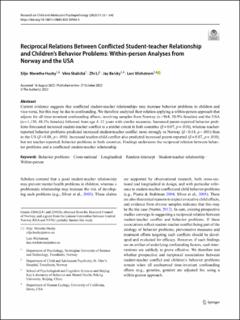Reciprocal Relations Between Conflicted Student-teacher Relationship and Children’s Behavior Problems: Within-person Analyses from Norway and the USA
Peer reviewed, Journal article
Published version
Permanent lenke
https://hdl.handle.net/11250/3064932Utgivelsesdato
2023Metadata
Vis full innførselSamlinger
- Institutt for psykologi [3143]
- Publikasjoner fra CRIStin - NTNU [38679]
- Publikasjoner fra Cristin - St. Olavs hospital [1611]
- St. Olavs hospital [2579]
Originalversjon
Research on Child and Adolescent Psychopathology. 2022, . 10.1007/s10802-022-00968-4Sammendrag
Current evidence suggests that conflicted student-teacher relationships may increase behavior problems in children and vice-versa, but this may be due to confounding. We therefore analyzed their relation applying a within-person approach that adjusts for all time-invariant confounding effects, involving samples from Norway (n = 964, 50.9% females) and the USA (n = 1,150, 48.3% females) followed from age 4–12 years with similar measures. Increased parent-reported behavior problems forecasted increased student-teacher conflict to a similar extent in both countries (β = 0.07, p = .010), whereas teacher-reported behavior problems predicted increased student-teacher conflict more strongly in Norway (β = 0.14, p = .001) than in the US (β = 0.08, p = .050). Increased teacher-child conflict also predicted increased parent-reported (β = 0.07, p = .010), but not teacher-reported, behavior problems in both countries. Findings underscore the reciprocal relation between behavior problems and a conflictual student-teacher relationship.

